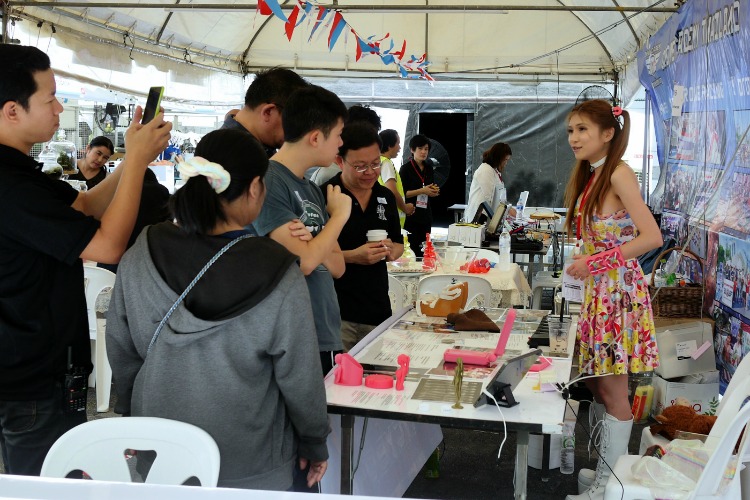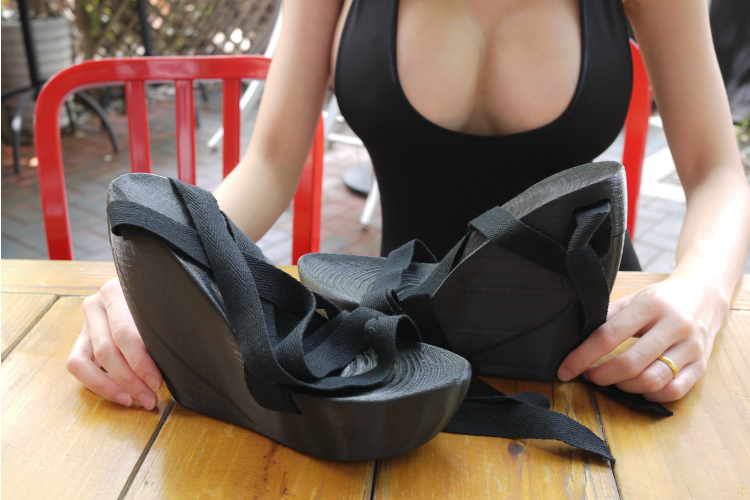Sexy Cyborg: “The maker community is for privileged white people”
Published 30 January 2017 by Elsa Ferreira
She has a flat stomach and a full brain. In Shenzhen, Naomi “Sexy Cyborg” Wu makes infinity mini-skirts and translucent “blinkinis”. Interview with the “lady maker”.
To each her own weapon. In order to promote maker culture, especially among young women, Naomi Wu, aka Sexy Cyborg, sports provocative clothes and badass gadgets. Wearing infinity mini-skirts, platform shoes with pockets and translucent blinkinis, Sexy Cyborg, 23, is attracting a growing fanbase… as well as some detractors. Because Wu is not to everyone’s taste. If she was invited this January 21-22 to the Bangkok Mini Maker Faire, last October 2016, her own hometown of Shenzhen preferred to do it without her—much to her chagrin. Feisty and full of energy, Naomi Wu answered our questions.

Is Naomi Wu your real name?
It’s my English name, but the one all my friends know me by. I have a Chinese name, of course, but I don’t use it much, and it’s possible to get a lot of personal information in China with just that, so it’s not something I talk about.
Why and how did you create this “Sexy Cyborg” character? Is it all persona or is it also the real you? Basically, when you are not being a maker, do you still dress just as sexy?
It’s the other way around, I actually wear more conservative clothing when taking maker pictures and video for English-speaking social media than I do normally just walking around and running errands. Westerners just seem to get enraged over silly clothes. Well, Americans and British mostly. Europeans and South Americans just think it’s funny and exciting, like Chinese do usually.
I have what I call the Auntie Test: Do Chinese women over about 50 or so have any problem with my clothes? The Auntie who cleans the halls in my apartment building has twice sent me back home for a sweater, but that is just because it was winter and catching a cold calls for Chinese Traditional Medicine. I was raised properly and am respectful. If the day comes and the neighborhood Aunties tell me not to dress so sexy, I won’t. But so long as they smile and wave at me, I don’t really think it’s anyone’s business what I wear in my own country.
Do you see yourself as feminist?
Feminism has very specific political implications in China, and I avoid politics. I try to encourage other women to pursue careers in STEM or at the very least technical self-sufficiency. The specific challenges we face in China are quite a bit different than in the rest of the world, so I have to use different tools. Anything labeled “feminism” has become a very difficult tool to use, unless you have a very powerful support base—which I do not.
You say you are working as a developer under a male name. Have you ever tried under your real name?
No. I imagine my experience would be quite different. I code to earn a living though, so I can’t really afford to take chances with my work.
I don’t spend a lot of time on this subject, because I don’t want people to think it’s a solution for the problems that many women face in tech. Working anonymously or under a pseudonym means being limited to much lower paid online work, since you can’t really use any Open Source contributions or other work for a resume.
Your projects are quite girly, with a hint of James Bond to them. I love your pocket shoes! How would you describe your style? What are your inspirations?

«Some Makers like to build homemade versions of commercial products, like a streaming web radio with a Raspberry Pi, for example. I come at it from more of a DIY point of view—I want cool gadgets, and if the kind I want don’t exist or I can’t afford them, I’ll make them.»
Sexy cyborg
Most of my inspiration comes from Chinese historical artifacts and inventions. My Maker Coin and vise both come from traditional Chinese designs. Pictures of ancient Chinese armor (两当铠) inspired the design for my Infinity Skirt, my Blinkini from the traditional fan dance, and my Pi-Palette with its “smart mirror” came from reading about the ancient Chinese magic mirror (透光鏡).

Do your projects have a message?
I suppose the most consistent message with all my projects largely comes from an early encounter I had when wearing my underlit LED skirt. A couple of expatriate girls loved the idea but were a bit scandalized—partially by me, partially by the shortness of the skirt. When walking off, I heard one whisper to the other: “If she can do it, how hard can it be?”, which once I thought about it, was the perfect message for me. Take away any excuse to not pursue greater technical competence. Tech is not just for your stereotypical geek girl or computer science graduate. These things are really within the reach of anyone now.

You have now started to film Shenzhen makerspaces, such as electronics markets and 3D printing cafés. How would you describe Shenzhen’s maker and open source communities?
We don’t really have a maker community. We have some well-funded “makerspaces”, but the tools are rarely used, and they are only really open for foreign reporters or government dignitaries. We do great at commercial hardware development, but that’s something different.
As for “Open Source”, it’s just a marketing term that factory bosses like to put on things. Few local Chinese know what it means, let alone are interested in following the terms of the licenses for the projects they use. I try to do what I can as an advocate, and the hardware groups humor me, but there’s only so much one very pushy person can do when everyone is doing something else.
360º tour of a 3D printing café in Shenzhen by Naomi Wu, 2016:
You seem to have some griefs with Raspberry Pi and «Make», which you accuse of ignoring you. Do you think it’s a challenge to be a woman in the maker community?
I think when trying to participate in a community, being an outsider is always an issue. There are obviously plenty of female makers featured in Make and on the Raspberry Pi Foundation’s website, so that alone is not the issue.
That there was a deliberate decision to exclude me is something pretty much everyone agrees on. Whether it’s justified is really the only point of contention. Make had been in contact with me for months but felt that it was preferable to have no female Chinese makers at the Shenzhen Maker Faire in October rather than to have me:
When you have a Maker Faire in a city of 10 million without a single local female Maker- your "movement" is broken. pic.twitter.com/FC1nsqdYty
— Naomi Wu (@RealSexyCyborg) January 23, 2017
…and Raspberry Pi’s issues are clear enough:
When you have an all White "Educational Foundation" snubbing a self-taught female Maker from a 2nd world country- your "movement" is broken. pic.twitter.com/eoR51bhg1i
— Naomi Wu (@RealSexyCyborg) January 23, 2017
Two years ago when I came across making, and all the books and magazines said they wanted people like me, I assumed that it was true. Now I know that people can achieve status within a community simply by saying they have certain values—without the inconvenience and wasted resources of acting on them. It’s much the same in China, the Party hangs banners espousing high-minded ideals to inspire people—but no one actually does that stuff. Shenzhen is “Maker City”, except that it has no Maker community, only engineers working in factories—it’s just a slogan for the tourists and foreign media.
As for Make and Raspberry Pi, sure I’m disappointed, but that’s my fault too for being naive and expecting foreigners to somehow be “better” than Chinese. I’m hardly going to be shocked to encounter the same barriers in the West that I’ve known all my life in the East. I learned this before I could crawl. It’s not about what you do—it’s about who you are, what your parents could do for you, and where you come from. That is like telling any Chinese person that water is wet. Active participation in the maker community and media is for privileged people, preferably White, with a Western education. Every demographic study, every Maker Faire attendance study shows it. It would have been nice if all the talk of inclusion was real, but it’s just for show. It’s not even a Western thing, life is exactly the same here.
So sure, I poke at Make and Raspberry Pi a little, but really, the community and the ingroup not really wanting outgroup participation is as old as time.
Naomi Wu does not have a Facebook account (the one online is not hers). She Tweets here and posts her projects and photos on Imgur.
